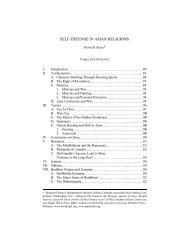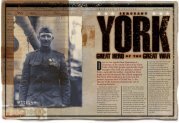You also want an ePaper? Increase the reach of your titles
YUMPU automatically turns print PDFs into web optimized ePapers that Google loves.
D . C . V H E L L E R : A N A 1 F E X C L U S I V E !<br />
I had filed an amicus brief on behalf<br />
of a broad coalition of pro-Second<br />
Amendment police organizations and<br />
district attorneys. When Gura found<br />
out that there would be an extra seat at<br />
the counsel table for oral argument, he<br />
invited me to come along and help.<br />
Representing d.c. was Walter<br />
Dellinger, who had formerly served as<br />
acting solicitor general (the lead Supreme<br />
Court lawyer) in the Clinton administration.<br />
Dellinger had previously argued 29<br />
Supreme Court cases, while this would<br />
be Gura’s first Supreme Court argument.<br />
At exactly 10 a.m., the marshal of<br />
the court announced “Oyez, oyez, oyez,”<br />
and we rose as the justices entered<br />
the courtroom.<br />
Because d.c. had lost the case in<br />
the lower court, Dellinger argued first.<br />
He began by explaining d.c.’s theory of<br />
the Second Amendment—that it has<br />
no practical effect today, for it serves<br />
no purpose other than to protect state<br />
militias, like those of the founding<br />
era, from being disarmed by the federal<br />
government.<br />
Chief Justice John Roberts interjected:<br />
“If you’re right, Mr. Dellinger, it’s<br />
certainly an odd way to phrase the<br />
operative provision. If it is limited to<br />
state militias, why would they say ‘the<br />
right of the people’? In other words, why<br />
wouldn’t they say ‘state militias have the<br />
right to keep and bear arms’?”<br />
Dellinger replied that, to the<br />
Founders, “the militia” included all the<br />
people. Chief Justice Roberts noted that<br />
Dellinger’s point would imply that the<br />
right to arms belongs to all the people.<br />
Justice Anthony Kennedy suggested<br />
that the first clause of the Second<br />
Amendment simply reaffirms the<br />
importance of the militia, but does not<br />
narrow the operative clause. This is a<br />
point made in a grammatical sense in an<br />
amicus brief by George Mason University<br />
School of Law Professor Nelson Lund,<br />
and in a historical sense in the amicus<br />
brief by David Hardy on behalf of<br />
Academics for the Second Amendment.<br />
Shortly thereafter, Justice Kennedy<br />
expressed skepticism about Dellinger’s<br />
ultra-narrow reading of the right to<br />
arms: “It had nothing to do with the<br />
34 America’s 1 st<br />
Freedom | June 2008<br />
concern of the remote settler to defend<br />
himself and his family against hostile<br />
Indian tribes and outlaws, wolves and<br />
bears and grizzlies and things like that?”<br />
Justice Kennedy then followed his<br />
question with the following statement:<br />
“In my view,” the Second Amendment<br />
supplemented the congressional militia<br />
powers in Article i “by saying there’s a<br />
general right to bear arms quite without<br />
reference to the militia either way.”<br />
Justice John Paul Stevens had long<br />
“What is reasonable<br />
about a total<br />
bAN<br />
on possession?”<br />
asked Chief<br />
JustiCe roberts.<br />
made it clear, in his written opinions,<br />
that he loathed firearms. He pointed out<br />
that in the early state constitutions, only<br />
Pennsylvania and Vermont explicitly<br />
mentioned self-defense as a reason for<br />
the right to arms, whereas others, such<br />
as Massachusetts, mentioned only “the<br />
common defence.”<br />
Justice Stevens led Dellinger into a<br />
discussion of 18th century English judge<br />
and scholar William Blackstone and of<br />
the 1689 English Declaration of Rights,<br />
which Stevens (apparently following the<br />
lead of a brief written by Roger Williams<br />
Law School Professor Carl Bogus and<br />
Ohio State University historian Saul<br />
Cornell) claimed to be a “group right,”<br />
rather than an individual right.<br />
Justice Antonin Scalia noted that<br />
Dellinger’s claim that “bear arms”<br />
was an exclusively military term was<br />
inconsistent with British laws, which<br />
had forbidden Catholics and Scottish<br />
Highlanders to “bear arms.” Those laws<br />
banned gun possession in general, not<br />
merely membership in the militia.<br />
Perhaps recognizing that his<br />
anti-individual rights argument was<br />
weak, Dellinger shifted to a backup<br />
argument: The 42 state constitutions<br />
that recognize an individual right to<br />
arms have a “reasonableness” standard<br />
for gun controls, so d.c.’s handgun ban<br />
is reasonable.<br />
“What is reasonable about a total<br />
ban on possession?” asked Chief<br />
Justice Roberts.<br />
That only handguns are banned,<br />
while rifles and shotguns are still<br />
allowed, Dellinger answered.<br />
The Chief Justice shot back: “So<br />
if you have a law that prohibits the<br />
possession of books, it’s all right if you<br />
allow the possession of newspapers?”<br />
Most of the rest of Dellinger’s initial<br />
presentation was consumed by a long<br />
discussion about machine guns and<br />
“armor-piercing” bullets. Dellinger<br />
argued that the decision of the u.s.<br />
Court of Appeals for the d.c. Circuit<br />
(which declared last spring that the<br />
handgun ban violated the Second<br />
Amendment) meant that machine guns<br />
and “armor-piercing” ammo bans were<br />
unconstitutional. Chief Justice Roberts<br />
and Justice Scalia disagreed, contending<br />
that the lower court’s opinion was<br />
simply about a categorical handgun ban.<br />
Justice Samuel Alito then asked<br />
Dellinger about the d.c. trigger lock law,<br />
which requires all guns in the home<br />
to be locked at all times. Dellinger<br />
conceded that the law, if read literally,<br />
would be unreasonable, but he insisted<br />
that there was an implicit exception that<br />
allowed for self-defense.<br />
Next, Solicitor General Paul<br />
Clement, representing the u.s.<br />
Department of Justice, had 15 minutes<br />
to make his own argument. The brief<br />
that he filed in January explained at<br />
length that the Second Amendment was




